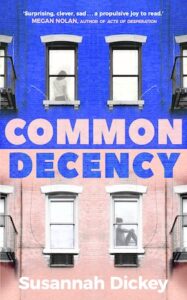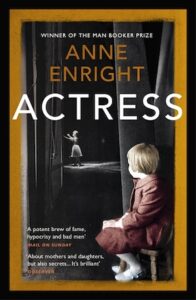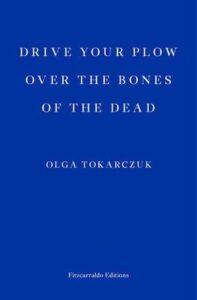Ten books about revenge (sort of)
by Susannah DickeyI’m going to play a little fast and loose with the concept of revenge here – in some cases there’ll be a subtle massaging, in others I’m just going to riff. If anyone is unhappy about this, might I suggest they consider a course of action via which they hurt or harm me in return for the wrong they have suffered at the hands of my suggestions. Or something.
Heatwave by Victor Jestin, translated by Sam Taylor
(Scribner UK hardback, July 2021; paperback July 2022)
“It was true that I’d sometimes wished he would die, certain days, seeing him smile in his blue trunks.”
Leonard is a teenager, on holiday with his family in the South of France. Torn between the seemingly dichotomous roles of child and nascent sexual adult, Leonard is uncomfortable, ontologically and physically (the oppressive heat intensifying every ill-fitting aspect of existing). One evening, Leonard comes across Oscar, an older boy with social cachet and a propensity for cruelty, hanging from the rope of a swing, alive and in desperate need of help. Held in stasis by hatred and chronic inaction, Leonard does nothing, and what follows is a claustrophobic and uncomfortable look at adolescence and shame.
Such a Fun Age by Kiley Reid
(Bloomsbury hardback, January 2020; paperback December 2020)
The ‘venge’ of revenge comes from the French vengier, which comes from the Latin vindicare – “to lay claim to, avenge, punish”. This idea of ‘laying claim’ seems pertinent to Reid’s novel, in which Emira, the protagonist, becomes an object of fixation for Alix, her white employer, and Kelley, her white boyfriend. Following an incident in a supermarket, Kelley casts himself as Emira’s champion of social justice. However, as Alix and Kelley’s shared past becomes known, both become increasingly desperate to best one another, thereby proving themselves the more righteous. Caught up in the complicated miasma of Kelley and Alix’s performative white guilt, Emira is at risk of becoming collateral damage.
The Dry Heart by Natalia Ginzburg, translated by Frances Frenaye
(Daunt Books paperback, May 2021)
Ginzburg’s novella is an incisive and cyclical examination of intimacy curdled by resentment and power. Described by Francesca Peacock as the the laureate of unfulfilling marriages and thwarted relationships, unwanted pregnancies and complicated, tangled families, Ginzburg explored how gender and social politics operate at a granular level, in the houses of wartime and post-war Italy. In this, a lonely woman meets a man called Alberto. Four years later, she shoots him in the head.
Actress by Anne Enright
(Jonathan Cape hardback, February 2020; Vintage paperback June 2021)
There are stylists who seem to manifest blistering insights purely from the care and attention they give to the construction of each individual sentence. Enright is one of those. Her most recent novel is written from the perspective of Norah O’Dell. Norah is the daughter of Katherine, a once-beloved performer, who ended her days in a psychiatric unit after shooting Boyd O’Neill, a filmmaker, in the foot. Norah unfurls their shared life, revealing the details of a life lived in the shadow of another life, a life lived entirely in the spotlight.
Revenge of the Lawn by Richard Brautigan
(Simon & Schuster paperback, September 1972; Picador February 1974; Canongate September 2014)
Okay, I’m going to admit that this book has very little to do with revenge. It is 62 ultra-short stories set in mid-century America, including the incredibly beautiful ‘Hallowe’en in Denver’:
“Satisfied?” she said.
She’s an Aries.
“Yes,” I said.
I’m an Aquarius.
We also had two pumpkins: both Scorpios.
The titular story itself though, is an absolute romp – an abridged family history, a chronicling of misadventure following one man’s neglect of a lawn.
Earthlings by Sayaka Murata, translated by Ginny Tapley Takemori
(Granta Books hardback, October 2020; paperback July 2021)
I read this book in a day, then had to sit in a darkened room with a cup of tepid tea for an hour until I felt safe again. I loved Convenience Store Woman, but Earthlings takes its themes to conclusions both unexpected and downright harrowing. The novel feels fearless, and Murata’s bravery as a prose stylist sits at perfect odds with her protagonist’s naivety and reticence in childhood, her retreat into narrative as a means of taking revenge upon her teacher and serial abuser. The book combines the aggressively cutesy with the unspeakably disturbed, and revenge is just one facet of this unbridled exploration of disassociation and loneliness.
Drive Your Plow over the Bones of the Dead by Olga Tokarczuk, translated by Antonia Lloyd-Jones
(Fitzcarraldo Editions paperback, September 2018)
Tokarczuk is a genius, and just part of the genius of this book is how she calls into question traditional hierarchies of the human and the other. The book’s protagonist is an older woman living in a remote Polish village, dismissed as mad by her community, and relegated to the back of everyone’s thoughts. Reclusive, but fiercely empathetic towards animals, Janina thinks of language and naming in radical ways, bestowing on people the epithets that spring to mind when she sees them – much like people have been doing to the creatures and things around them since language’s conception. “I’m sure this is the right way to use language,” she says, “Rather than tossing about words stripped of all meaning.” When members of the local hunting club are murdered, Janina is ambivalent: “it occurred to me that in a way Big Foot’s death might be a good thing. It had freed him from the mess that was his life. And it had freed other living Creatures from him. Oh yes, suddenly I realized what a good thing death can be, how just and fair, like a disinfectant, or a vacuum cleaner.” Certain the animals themselves are doing it, as an act of revenge for the pain wrought by humanity upon them, Tokarczuk’s book is part mystery, part radical exercise in dismantlement, part study of the poetry of William Blake.
Kim Jiyoung, Born 1982 by Cho Nam-Joo, translated by Jamie Chang
(Scribner UK paperback, January 2021)
This one is a little less ‘revenge’-y, little more ‘the unsustainability of expecting women to endure patriarchal control and oppression forever’-y. The complete dissolution of a woman’s sense of self can’t really be categorised as an act of revenge, but it’s an incredible study into the membranes between women, made porous by the endemic misogyny of South Korea. After a life of relentless harassment, belittlement, subjugation, Kim Jiyoung begins to flicker, adopting the personas of other women (her mother, a dead college friend). The book uses an incredible formal device to set narrative alongside statistic, and concludes with Kim’s counsellor preparing to replace his assistant, a woman about to become a mother. “I’ll have to make sure her replacement is unmarried,” he says. In a way, this, more than Kim’s inability to survive the conditions of womanhood, is perhaps, bleakly, the real revenge: revenge against women for wanting to be seen as people.
The Union of Synchronised Swimmers by Cristina Sandu, translated by Cristina Sandu
(Scribe UK paperback, June 2021)
In an undisclosed Soviet State, six young women meet once a day to swim, seeking solace from the hardships of their daily lives. When swimming offers them something beyond peace – the chance to compete at the Olympics and gain glory – they seize the opportunity, not to win a medal, but to defect, exerting a small act of disobedience against life behind the Iron Curtain. Years later, each of the swimmers is flung across the globe, each living an unrecognisable life. This slight, enigmatic book leaves much unsaid, but is a delicate and precise study of a diasporic existence, of how sometimes leaving is no better than staying.
Sterling Karat Gold by Isabel Waidner
(Peninsular Press paperback, June 2021)
Winner of the Goldsmiths Prize 2021, this book is an excoriating, absurdist interrogation of state violence against bodies categorised as undesirable – the gender-nonconforming bodies, the black bodies, the working-class bodies. To say too much would be to give away this book’s startling denouement, but it is a complex rallying cry for organising, community-minded coalition, and holding to account those who have wronged you.
 Susannah Dickey grew up in Derry and now lives in London. She is the author of two poetry pamphlets, I had some very slight concerns (2017) and genuine human values (2018). Her poetry has been published in Ambit, The White Review, Poetry Ireland Review and Magma, amongst others. In 2018 she was shortlisted for The White Review short story prize, and in 2017 she was the winner of the inaugural Verve Poetry Festival competition. Her debut novel, Tennis Lessons, was published in July 2020. Common Decency, her second, is out now from Doubleday UK in hardback and eBook.
Susannah Dickey grew up in Derry and now lives in London. She is the author of two poetry pamphlets, I had some very slight concerns (2017) and genuine human values (2018). Her poetry has been published in Ambit, The White Review, Poetry Ireland Review and Magma, amongst others. In 2018 she was shortlisted for The White Review short story prize, and in 2017 she was the winner of the inaugural Verve Poetry Festival competition. Her debut novel, Tennis Lessons, was published in July 2020. Common Decency, her second, is out now from Doubleday UK in hardback and eBook.
Read more
@SusannahDickey
@DoubledayUK
Author portrait © James Dickey




